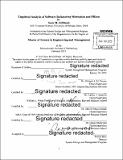| dc.contributor.advisor | Michael A. M. Davies, Carliss Y. Baldwin, Alan D. MacCormack and Daniel Sturtevant. | en_US |
| dc.contributor.author | Gilliland, Sean M. (Sean Michael) | en_US |
| dc.contributor.other | System Design and Management Program. | en_US |
| dc.date.accessioned | 2015-12-16T16:35:10Z | |
| dc.date.available | 2015-12-16T16:35:10Z | |
| dc.date.copyright | 2015 | en_US |
| dc.date.issued | 2015 | en_US |
| dc.identifier.uri | http://hdl.handle.net/1721.1/100376 | |
| dc.description | Thesis: S.M. in Engineering and Management, Massachusetts Institute of Technology, Engineering Systems Division, System Design and Management Program, 2015. | en_US |
| dc.description | Cataloged from PDF version of thesis. | en_US |
| dc.description | Includes bibliographical references (pages 68-69). | en_US |
| dc.description.abstract | As complexity and levels of technical debt within software systems increase over time the incentive of an organization to refactor legacy software likewise increases. However, the opportunity cost of such refactoring in terms of engineering time and monetary investment have proven difficult to effectively trade against the long term benefits of such refactoring. The research investigates the empirical effects of a multi-year refactoring effort performed at a world-leading software development organization. DSM architectural representations of software pre- and post-refactoring were compared using core-periphery analysis, and various quantitative metrics were identified and compared to identify leading indicators of refactoring. The research finds several uniquely identifying properties of the area of the software system identified for refactor, and performs a comparison of these properties against the architectural complexity of those modules. The paper concludes with suggestions for additional areas of research. | en_US |
| dc.description.statementofresponsibility | by Sean M. Gilliland. | en_US |
| dc.format.extent | 71 pages | en_US |
| dc.language.iso | eng | en_US |
| dc.publisher | Massachusetts Institute of Technology | en_US |
| dc.rights | M.I.T. theses are protected by copyright. They may be viewed from this source for any purpose, but reproduction or distribution in any format is prohibited without written permission. See provided URL for inquiries about permission. | en_US |
| dc.rights.uri | http://dspace.mit.edu/handle/1721.1/7582 | en_US |
| dc.subject | Engineering Systems Division. | en_US |
| dc.subject | System Design and Management Program. | en_US |
| dc.title | Empirical analysis of software refactoring motivation and effects | en_US |
| dc.type | Thesis | en_US |
| dc.description.degree | S.M. in Engineering and Management | en_US |
| dc.contributor.department | System Design and Management Program. | en_US |
| dc.contributor.department | Massachusetts Institute of Technology. Engineering Systems Division | |
| dc.identifier.oclc | 931708711 | en_US |

